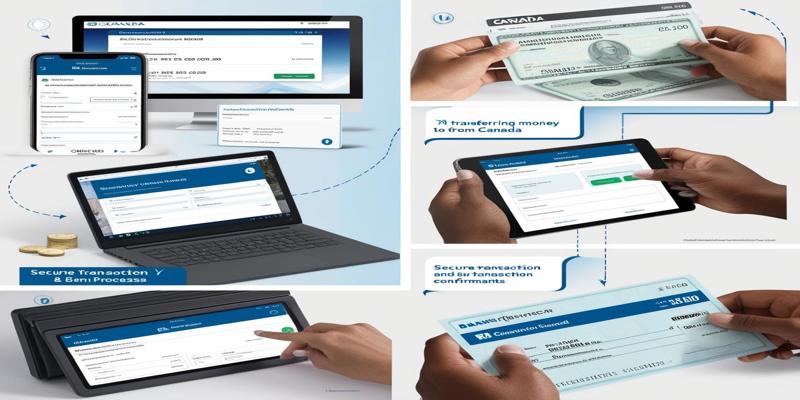How to Send and Receive Money in Canada
Dec 11, 2024 By Darnell Malan
Do you need to send money across the border into or out of Canada? Whether transferring money to or moving funds out of Canada, you must understand your options. International money transfers can sometimes feel overwhelming, but good knowledge and appropriate tools will enable you to complete your transaction efficiently and at the lowest cost possible.
Understanding International Money Transfers

Though international money transfers appear complex at first glance, they can quickly become more manageable with the proper knowledge. Whether you need to send money to your family abroad, make payments for something you have purchased overseas, or even receive money from international clients, taking the time to understand the basics is paramount.
Types of International Transfers
There are several ways to transfer money across borders. Wire transfers are one of the most common options for dealing with large sums securely and swiftly. Online money transfer services are famous for convenience and usually offer lower charges. International money orders or prepaid debit cards are practical alternatives for lesser amounts.
Factors Affecting Transfers
While sending off money internationally, some key factors to be considered while initiating the transfer include:
- Exchange rate
- Transfer fees
- Time for processing
- Security
Exchange rates constantly change, leading to varying amounts that the recipient finally receives. It will be a good idea to check the rates of different providers before transferring. The fees will also differ between services, so consider these when calculating your amounts. Depending on the method and destination, processing times range from minutes to several business days.
Options for Sending Money to Canada
To transfer funds to Canada, you have various options that will work equally well for you. Each of them has its strengths and caters to different needs and preferences.
Bank Transfers
Many people still prefer traditional bank transfers. They are secure and easy to make but be prepared to pay higher fees, which may take longer than other methods.
Online Money Transfer Services
Consider online money transfer services, which can be quicker and, in many instances, more cost-effective. Providers like Wise, OFX, and WorldRemit boast better-than-usual exchange rates with fewer fees than banks. These become valuable for regular small transfers.
PayPal and E-Wallets
Services like PayPal and other e-wallets still make it easy to send money to Canada, especially if you're dealing with minor or personal amounts. While they're fast and painless, just be conscious of potential currency conversion fees.
Receiving Money Transfers While in Canada

Understanding Your Options
You must know your options when you are in Canada and awaiting funds from outside the country. Many services for the transfer of money internationally offer direct deposits into a Canadian bank account, which is usually the easiest and most economical option. At the same time, other services will enable you to pick up cash at specific locations, which may be helpful until you get a local bank account.
Setting Up Your Transfer
In most cases, you will be required to provide the sender with information that usually includes your full name exactly as it appears on your ID, Canadian bank account information applicable, and sometimes a unique reference number assigned by the transfer service. It is essential to confirm all information to ensure an error-free transaction.
Fees and Exchange Rates
Remember that some transfers involve a fee on the sending service's end or with your receiving bank. Please pay close attention to the given exchange rate, as it will determine how much money is in your pocket. Some services provide much better rates than others, so if you anticipate transfers coming in regularly, you'll want to shop around to ensure you're getting the best rate.
Tips for Avoiding Fees and Getting the Best Exchange Rate
Skilled consumers sending money from or to Canada can reduce their fees and obtain a reasonable exchange rate in several ways. Here are some essential tips that can help you get the most out of your money's value:
Compare Multiple Providers
Take your time with the first option that comes your way. Have a look at the rates various money transfer services, banks, and online websites have to offer. Sometimes, more than the exchange rate is needed; you need to get all the fees associated with your transfer to find out the actual cost of your transfer.
Time Your Transfer Wisely
Exchanger rates change in seconds. Watch out for the market and try to make transfers when the rate is in your favor. Most such services will offer to warn when favorable rates become available: you specify an excellent rate for you, and they notify you when this rate is available.
Choose the Right Transfer Method
The methods of transfers also vary in cost and ways of currency conversion. Wire transfers are quicker but at a higher price than ACH transfers, which take time yet are cheaper. Know your urgency and budget before you make a choice.
Frequently Asked Questions About Sending Money to Canada
What's the fastest way to transfer money to Canada?
Digital money transfer services are usually the fastest way to send money. Companies like TransferWise- now Wise, or PayPal, can have cash in your bank in 1-2 business days. The faster the transfer, the higher the fee, so be prepared.
Are there limits on how much money I can send to Canada?
While there is no legal limit to how much money you can transfer to Canada, each bank or transfer service has restrictions. These vary widely from a few thousand dollars to hundreds of thousands and sometimes may depend on your relationship with the provider. Do I Have to Pay Taxes on Money Transferred to Canada?
Do I need to pay taxes on money transferred to Canada?
Generally, any gift received in Canada is not taxable. However, if the transfer is a business one or is higher than the threshold amounts, it has to be declared with the Canada Revenue Agency. If the transfers are significant, it is always advisable to seek the services of a tax professional so that the transfer is entirely compliant with Canadian tax laws.
Conclusion
With that in mind, remember that each of those ways has its advantages and considerations: careful consideration of your needs for transfer speed, fees, and exchange rates. From bank transfers to online money transfer services to other methods, ensuring security and conformity with regulations are at the forefront of every option you choose.








